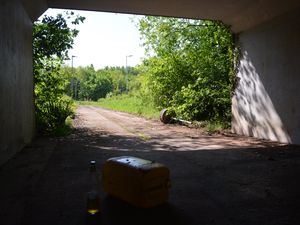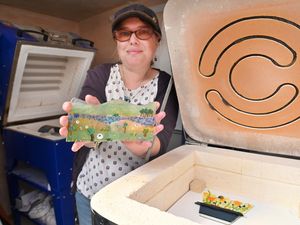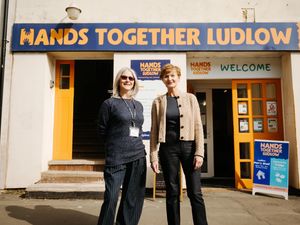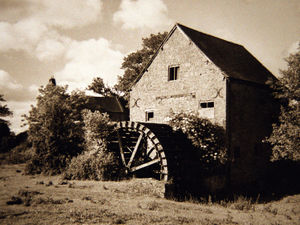Pregnant on the streets: Shropshire couple's life of rough sleeping
Shropshire's homeless people tell their stories amid a rise in the number of rough sleepers.
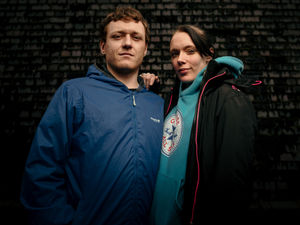
A young woman sits on a high street next to bags containing everything she owns. She is hungry, she is cold and she is pregnant.
Paula Cook watches birds pick over a discarded sandwich. She is so desperate to eat. Homeless and pregnant, she is in need of any morsel of food.
“There was one person who knew I was hungry but ate part of his sausage sandwich and chucked the rest to the birds right in front of me,” says 30-year-old Paula. “I cried, I was starving hungry, I was pregnant.
“Another time I got abuse because I was tired. I hadn’t slept properly that night so I just wanted to stay in my sleeping bag in the doorway and a bloke came over and started giving me abuse, calling me ‘lazy’. The fact is we, homeless people, don’t get to sleep properly at night, we get moved all the time. It’s horrible.”
Homelessness has become an increasingly prominent issue in our town centres.
Demand on a Telford homeless service has more than tripled over the last 10 years.
In 2009 the KiP Project in Wellington helped 160 rough sleepers and homeless people, but in 2018 that rose to 526.
Meanwhile in Shrewsbury there are about 20 current rough sleepers, the Shrewsbury Ark have said.
The day centre for the homeless says about 150 different people used its services between November and February.
During the winter it launched the Severe Weather Emergency Protocol with Shropshire Council and opened its doors to ensure rough sleepers had somewhere warm to go. The Ark said that on any given night there were 11 people using the facility
Life on the streets
Paula and her partner Nathan Harley-Thomas have been homeless in Shrewsbury for a while.
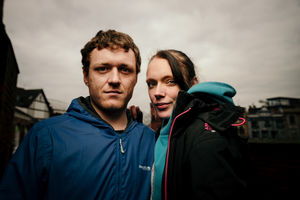
A couple of years ago Paula was firmly on her feet. She had kicked the alcohol and drugs addictions which affected her youth and had a home to call her own.
“I had my own two-bedroom flat, a full-time job at McDonald’s, I had my whole life sorted. But I got into a bad relationship, drugs came back into my life and it just spiralled from there. I lost everything,” she says.
Paula met Nathan, 27, while he was already homeless.
He had been on and off the streets since he was 14. He has struggled to find a house or any work after spending time in prison for assault – a crime he says he regrets.
He admits having used crack cocaine and spice while on the streets to find a form of escape, but says he has been clean for some time.
“Nathan was there to help me, he was already on the streets,” says Paula. “If I hadn’t met him, I don’t know what would have happened. I didn’t know anything and he taught me so much. He told me about cardboard boxes and folding them to pad the floor out to keep warm and little things like that. He’s kept me safe.
“When you’re on the streets you really value what you do have. If you have a pair of shoes that keep your feet warm, then that’s all you need. The thing I value the most is him at night. He was the thing that kept me warm at night.”
Nathan does his best to protect Paula while on the streets and says they would always sleep in a certain way to keep themselves safe.
“When we settle she sleeps on the inside and I sleep on the outside so I can take the brunt of anything that might happen and I can jump up,” he says.
It is a common tactic for rough sleepers, who congregate together both for safety and for warmth.
But one night he left his Paula in the doorway of the Boots store in the town centre to go and take a sleeping bag to someone who was without. In that short few minutes Paula was sexually assaulted.
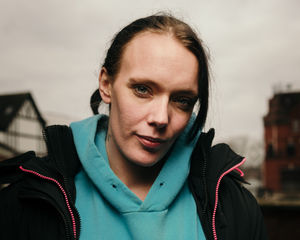
“I woke up to a bloke climbing into my sleeping bag,” said Paula. “He was putting his hands on me. It was really quite scary. I yelled ‘get away from me now’ when I realised it wasn’t Nathan.”
They assault was reported to police but the man was never found.
The couple spent time sofa surfing at friends houses as well as sleeping on the streets. Paula got pregnant in 2017, leading to some of the toughest months in their relationship.
“Trying to get a house was unreal,” she says. “I had to wait until I was 28 weeks and I had a MAT B1 form to prove I was pregnant. The fact I had positive pregnancy tests and a bump was irrelevant.
“For 28 weeks you are lying in the street. I had pregnancy sciatica, so getting up was hard and getting better was near impossible.” The couple would trudge through the town carrying everything they owned in bags, trying to stay warm and get food.
“The first few months are the most dangerous in a pregnancy, anything can happen,” said Nathan.
“We had no food or anything. I’d be desperately trying to get a pound so I could get her a sausage roll or a pasty. Anything to feed her and the baby.”
The baby was born safe and well but was taken into foster care and the couple now see her a couple of times a week. Paula is currently in a bedsit and Nathan is sofa surfing, but both admit that they don’t feel it will be long before they are back on the streets.
“Instead of landing on my feet I’ve landed on my knees,” says Paula. “I know I won’t last long in there because the rent is too high and it will put me more in debt. I need a place in order to get my daughter back, but I need my daughter in order for me to be able to pay the full rent. I’m losing.”
Nathan says he is desperate to get his life on track. He wants to work, get a roof over his head and try and be able to provide a good life for his daughter, but says he is finding himself in an almost impossible situation.
“I’m trying my hardest to get a place, I want to get a job,” he says. “But in order for me to get a job I need a house and in order for me to get a house I need a job. I’m stuck.”
Paula and Nathan tell their story during breakfast time at The Shrewsbury Ark. Paula is a talented artist and there are pictures of her’s dotted around the Ark.
Homeless people from across the town drop in for a cup of tea, to use the phone, internet and for warmth and sociability. It’s ever changing and feels slightly chaotic.
As men and woman of all ages put away slices of toast, porridge and fruit you can see how grateful they are for food, and it is food tends that is the top priority for a large section of homeless people.
“If you don’t want to give people change then please get them food. What we can eat helps us sleep at night. Having a full body gives it fuel to keep warm,” says Paula.
“I got in a bit of an argument with a taxi driver once, and I asked him what he thought the first thing a homeless person will buy with money. He said drugs. No.
“The homeless meet outside Greggs first thing in the morning for a cup of tea and food.
“We are our own little family. The nicest people you will meet are the ones on the street.”
High and dry when work disappeared
As he boarded a flight from Poland to the UK Marcin Kujawa was leaving behind a broken marriage and his young son.
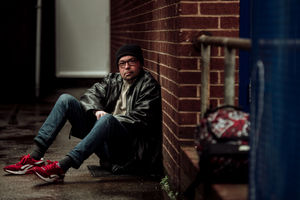
He was full of hope of being able to get work and send money back home to support his son as he grew up.
Marcin, 43, from the north western city of Szczecin, found work at ABP in Shrewsbury and DENSO in Telford.
But when he got offered a job doing driveways in return for accommodation and three meals Monday to Saturday it was too good to turn down – but it began his journey to homelessness.
“For three years I worked for Irish gipsies in Norwich, Coventry, Birmingham. It was no tax, no national insurance, just cash in hand,” he says at KiP@Maninplace in Wellington.
“I had a caravan, it was in good condition, not new, but good. It had a fridge, TV, microwave, it was good. On a Sunday it was just for me. I would buy some tobacco, a can of beer and maybe a pizza.”
But after poor weather and work drying up Marcin was deemed surplus to requirements in August 2018.
“I had no money for rent. I went on the streets. My ID card, my passport got taken,” he said.
“Sometimes I stay at friends, sometimes I’m here on the streets in Wellington. I have a sleeping bag. Sometimes I’ll go to an empty place where nobody lives, corridors, doors. Sometimes I’ll walk all night.”
In order to get food Marcin will often to drop leaflets through doors for takeaways in the town in return for a meal.
Marty Howells is the new KiP manager and he is helping Marcin to try to get his life back.
“He had every intention of doing everything correctly. He got a job. But he ended up being abused by not having a right employment channel,” he says.
“The work dried up and all these things were taken from him.”
Complex reasons for increasing figures
The reason for a rise in homelessness is difficult to pinpoint, says Steve Watkins, the outgoing manager of KiP@ManinPlace in Telford.
Steve Watkins has been leading leading the service which provides assistance to the homeless and rough sleepers for the last decade, and he says he has seen demand go up year on year.
“It went from 160 odd then to now in excess of 500,” he says.
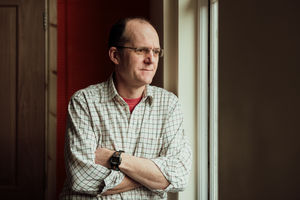
Mr Watkins says he doesn’t believe there is any one overarching reason there has been a rise in homelessness.
“There will be a number of other things that have happened. It could be relationship breakdowns, substance misuse, mental health problems, job loss and unaffordable housing,” he adds.
“When a service is overwhelmed there are two things happening. Number one is the problem is getting worse, and number two is that we are good at what we do.
“But we have struggled with our statistics over the nine years I have been here to boil it down to what is going on out there.”
Mr Watkins believes that there are wide ranging social issues which start off a chain of effects which leads to many being on the streets.
“As far as for a significant reason someone is homeless, if someone comes in to us and we say ‘why are you homeless?’ the answer will often be ‘my partner kicked me out’. A relationship issue has caused them to become homeless. But there is a back story,” says Mr Watkins.
“What has happened? Is the relationship dysfunctional, some might use the word toxic. Are there substances? Does the partner have mental health problems? Has someone lost their job and started drinking? The back story is big.
“When someone loses their job then the dominoes start to fall and the last thing that happens is a partner says ‘get out’.
“It’s a chain of events and lots of circumstances. You can’t prescribe for that.”
Mr Watkins says that KiP offers an approach to try and bring lots other organisations together.
“My belief has always been that we have isolated silos of support,” he adds. “You may have mental health, drug addiction, criminal justice support, homelessness, work related support, GPs, all these things.
“We have to link together and have a joined up approach, and that is what we’ve worked on a KiP to try and make other sources of support accountable, otherwise it’s like a hot potato.
“It all has to be part of a structured plan.”

